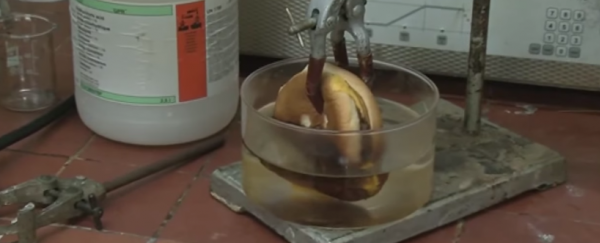
This cheeseburger vs. acid experiment by YouTube channel Periodic Videos is a classic, from way back in 2010. But it's still one of our favourite YouTube experiments of all time, and we thought it was definitely worth bringing it out of the archives for any of you who may have missed the truly revolting results.
The set-up itself is pretty simple - take one McDonald's cheeseburger and stick it in hydrochloric acid in the lab for three and a half hours to see what happens.
Why hydrochloric acid? Because it's one of the main ingredients in our stomach acid, which kick-starts the digestive process and helps us break food down into useable components that give us energy and nutrients.
Or, at least, that's what happens in theory. In reality, what it does to the cheeseburger is a little less stomach-friendly, as you can see in the footage above.
But although it's easy to assume that the resulting black sludge is caused by some nasty ingredients used in fast food, that's not necessarily the case.
For starters, the experiment isn't a true replication of our stomach environment - we also produce bile and many other types of acid churn around in our stomachs to help break down food much more effectively. As the Periodic Videos team explains above, in this example, the fats haven't dissolved very well simply because they're just soaking in nothing but concentrated HCL.
And while it's easy to jump to conclusions when it comes to fast food, we also can't necessarily assume that a cheeseburger would break down any better or worse than any other food item, as we have nothing to compare the results to.
Last year, another video went viral after it showed a range of fast food burgers 30 days after purchasing. Creepily, while some of them were covered in mould, others (McDonald's included) hadn't changed at all, as you can see below.

Most viewers immediately assumed this was the result of some kind of evil preservative being used by fast food companies. But a follow-up experiment by chef J. Kenji López-Alt over on his blog Serious Eats suggests that the reason some burgers don't rot could be a lot more innocent - it may simply have to do with water content.
While investigating why McDonald's burgers didn't become mouldy, he hypothesised that it was most likely due to one of five things:
- The burgers are filled with preservatives
- They are too salty to rot
- The burgers dry out fast enough that mould can't grow on them
- They never come into contact with mould spores
- They're never exposed to air
He pretty quickly ruled out the second two because, well, mould spores are everywhere, and so is air. But to test the first three, López-Alt made his own home-made burgers with no preservatives and varying amounts of salt, and stored them alongside McDonald's burgers. And he found that they also didn't rot after 25 days.
In fact, his results suggest that it's the large surface area to volume ratio of the McDonald's cheeseburgers that keep them mould-free, not their preservatives, as they lose moisture too quickly to allow mould to grow in the first place. He backed that up by showing that if you seal a McDonald's cheeseburger in a ziplock bag, it quickly begins to rot.
Obviously these results haven't been reproduced or published in a peer-reviewed journal, and we could all stand to eat less fast food regardless of its preservative content, but they reinforce the fact that there's always more going on than meets the eye.
So enjoy watching scientists stick a burger into acid, simply because it's really freaking cool to watch and creep your friends out with. But don't forget to think for yourselves, too.
Now excuse me while I go and imagine everything I've ever eaten sitting my stomach as black sludge.
